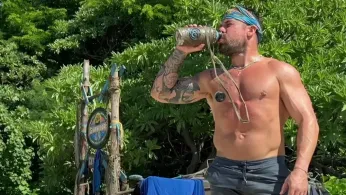
3 hours ago
‘Survivor 49’ Snake Bite Crisis: Jake Latimer Shares Harrowing Ordeal and Emotional Aftermath
READ TIME: 15 MIN.
The 49th season of CBS’s “Survivor” took an unexpected and dramatic turn when contestant Jake Latimer, a 36-year-old Canadian and soon-to-be father, was bitten by a highly venomous black-banded sea krait while wading in shallow water near his tribe’s camp in Fiji. The event, which aired on October 8, 2025, is now regarded as one of the most dangerous medical emergencies in the show’s history .
Latimer’s ordeal began in an instant. “I open my eyes and the snake is latched onto the bottom of my foot, mouth wide open,” he recounted in an interview with Entertainment Weekly. “You’re thinking you’re going to die” . The black-banded sea krait, one of the world’s most venomous snakes, is rarely aggressive, but its bite can be fatal without immediate medical intervention.
As the venomous snake released its grip, Latimer alerted his tribemates and was immediately transported by “Survivor” production staff to the medical team’s base camp. Medical professionals and host Jeff Probst rushed to his side, initiating an urgent assessment and stabilization .
On arrival at the Survivor base camp, the medical team determined that Latimer had suffered what is known as a “dry bite”—a strike in which the snake does not inject venom. Nevertheless, the situation was treated as critical due to the potential for delayed symptoms and the high toxicity of the species involved. “We have to treat it as the worst possible scenario,” a medical team member explained on camera, underscoring the danger Latimer faced .
Latimer’s emotional state mirrored the physical emergency. As an expectant father, his thoughts raced to his pregnant wife and unborn child back home in Canada. “Am I ever going to get off this island? Am I going to meet my child?” he recalled thinking while being stretchered away from camp .
The psychological impact of the bite was profound. Survivor’s medical staff and Jeff Probst comforted Latimer, assuring him of his safety and the comprehensive care available. Probst was heard reassuring Latimer, “You’re in really good hands. You have a full-on medical team here” . Despite the relief that no venom had been injected, the experience left Latimer shaken and emotionally exhausted.
After careful deliberation, Survivor’s producers and medical consultants made the difficult decision to pull Latimer from the game, prioritizing his health and well-being. “There’s no way, Jake, even in the next 48 hours, we could put you back out into such an unforgiving situation as Survivor,” Probst stated .
The decision was heartbreaking for Latimer, who had joined the show not only in pursuit of the $1 million prize but also as a personal journey of growth and a tribute to his late father. “This was my goal, man. Coming on the show was what I needed to do for my dad, for myself, for my kid, to bring home some money,” he reflected. “For something like this to pull me out of the game—it’s just not my fault” .
Latimer’s exit, though involuntary, brought an unexpected blessing. Just 48 hours after leaving Fiji, he returned to Canada in time to witness the birth of his son, Jax. “I also got to see the birth of Jax, and that’s worth a million dollars,” he shared, acknowledging the bittersweet nature of his Survivor journey’s abrupt end .
Latimer’s snake bite and subsequent evacuation have sparked renewed discussions about contestant safety on reality TV and the unpredictable hazards participants face. Survivor’s swift medical response and transparent handling of the incident have been widely commended in entertainment circles .
For the LGBTQ+ community and other marginalized groups, Latimer’s story resonates beyond the immediate drama. Survivor’s diverse casting and inclusive approach, particularly in recent seasons, serve as a reminder that all identities—including LGBTQ+ contestants—face unique and sometimes amplified challenges in high-stress, high-visibility environments. The emotional vulnerability displayed by Latimer, and the support he received from fellow contestants and production, highlights the importance of ensuring safe, equitable conditions for all participants, regardless of gender identity or sexual orientation.
The show’s continued efforts toward inclusivity, both in its casting and in its portrayal of personal narratives, reinforce its relevance as a cultural touchstone for viewers of all backgrounds. Survivor’s handling of Latimer’s emergency—a combination of medical rigor, human empathy, and respect for individual circumstances—sets a standard for reality television and offers a hopeful blueprint for future seasons.
As Latimer continues his recovery and embraces new fatherhood, his story remains a powerful testament to resilience, the unpredictability of reality TV, and the enduring importance of care, community, and representation.






